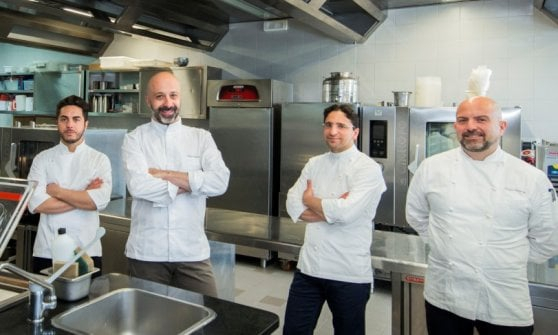“I intend to create my code of the great Italian contemporary cuisine, capable of going very far. Where humble ingredients are made noble by means of technique, and sophisticated ones are adjusted and refined with a touch of simplicity”.
We had already published Niko Romito’s complete manifesto for his most recent challenge with Bulgari Hotels: bring the richness of Italian tradition, in its simplicity, to every corner of the world, as if it was just pulled out of the oven in the mountains surrounding Casadonna. Indeed it is there, in Niko’s Laboratorio, what with the bakery and the main kitchen at Reale, that Niko and his squires have discussed, prepared, catalogued and archived all the recipes for this project.
The squires, in order of opening, are: Claudio Catino, from Bisceglie (Best sous chef for Guida di Identità Golose 2017, when he was working with Andrea Berton in Milan) for the restaurant in Beijing, opened a few days ago; Giacomo Amicucci, from Romagna, for the restaurant in Dubai (to open by the end of the year) and Davide Capucchio, from Torino, for the restaurant in Shanghai (to open in March 2018). The ambitious idea is to create a cuisine of the highest standards, that is true and genuine and, in a way following the example of Ducasse, can be replicated in every corner of the world. A cuisine that even through some (seemingly) simple spaghetti with tomato can charm a guest in Dubai, Milan or Beijing, as well as one in the mountains of Abruzzo.

In the middle, Niko Romito and his resident chef in Beijing Claudio Catino (second from the right)
Easier said than done. In fact, it’s terribly difficult to accomplish, especially starting from a parterre like China (Beijing being the first outpost, Shanghai the third coming up) where the Michelin guide hasn’t dared to set foot for years, because finding who will supply the ingredients and the human resources for this kind of
endeavour are both hard. They lack experience, the meaning of an impeccable service, the knowledge of flavours... in other words, the software, or the soft skills, in the words of marketing gurus. So basically replicability, here in China, is a matter of opinion (and perhaps it’s not a coincidence that the only three-starred restaurants in mainland China belong to three-starred stables like
Ducasse-
Robuchon-
Bombana). Perhaps this is the reason why efficient
Antonio Saponara, Neapolitan GM at
hotel Bulgari in Beijing, surrounded himself with a dozen Italians. The same applies for
Il Ristorante which has a very respectful Italian parterre surrounding
Claudio Catino, including
Stefano Attardi, executive chef at the hotel,
Dario Schiavoni, the restaurants’ director,
Marco Morandini, sous chef, plus 3 more
laowai in the dining room.
The ingredients are all there. The hotel is a marvel of made in Italy, with Bulgari’s taste for design, the interiors by Citterio, the use of workers from our country, from the suites to the amenities in the bathroom plus the gym and the swimming pool. All this in an amazing location, right in front of the clearing with all the embassies, in Chaoyang, enjoying one of the few green spaces in town. In every corner, you can smell a longing for perfection. And even at the helm of the restaurant, from afar, with Niko Romito, and on location with the chef de cuisine Claudio Catino.
“We understood the size of the challenge”, says Catino, “right from the first day we were running, when we realised the amount of commitment and attention required to feed 300 people.” All the recipes created and designed at the Laboratorio in Abruzzo were pondered, measured, standardised and catalogued. “Even the salt was weighed with milligram precision and codified”. Each course had an average of 4 mini-containers per guest...” times 300! The kitchen must have looked like Qin Shi Huang’s Terracotta Army.
The initial approach was right: so the extraction of Assoluto vegetable stock, with a touch of Champagne, and the infusion of mushrooms (from Yunnan) are a real blast in the palate that you would not necessarily expect from
Niko. The Antipasto all’italiana is a beautiful parade of all that Italy’s food-cart tradition has produced, over a century, across the regions. The
Crispy piglet cooked 12 hours at 72 degrees is delicious, and the same goes for the lasagne: the former has a
coup de maître in the shape of orange sauce, the latter has an aroma of lemon zest, representing
Romito’s passion for a touch of citrus.
The
Pasta mista with tomato, squid, garlic and parsley and the spaghetti with tomato are the emblems of Romito’s sic et simpliciter. Please only note some ingredients like melon (in Prosciutto and melon) have more to do with Mother Earth than with the rules of replicability. Like at
Reale, there are two tasting menus: a
sharing one (1388 rmb, some 180 euros) and a more aspirational “tasting” menu (1688 rmb, 217 euros).
Translated into English by Slawka G. Scarso
See also
Niko Romito: il mio progetto con Bulgari